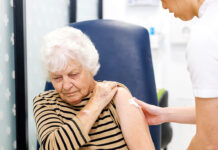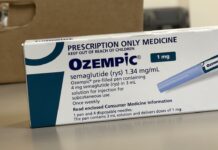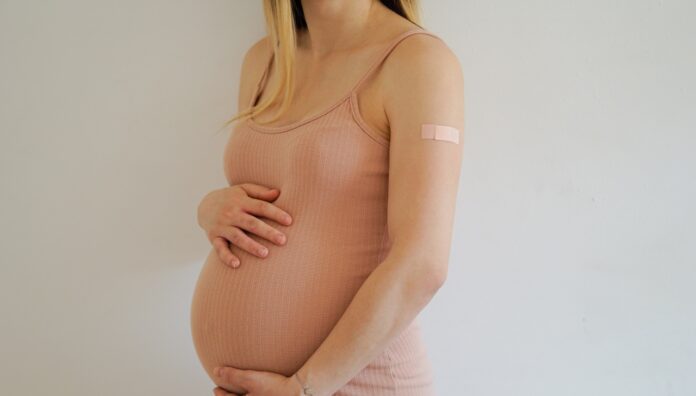With experts expecting a whooping cough outbreak next month, pharmacists can help to protect those most at risk through promoting testing and vaccination.
Australia is currently awash with respiratory symptoms. While many people will be infected with COVID-19, given we’re in the midst of our 8th wave, others will likely have whooping cough, said University of Sydney professor of paediatrics and child health, Robert Booy.
‘The rate of reporting of whooping cough in 2023 is three times higher than it was last year,’ he said. ‘Case numbers are rising all over Australia, particularly down the east coast in Queensland, New South Wales and Victoria.’
During the pertussis outbreak in 2015, case numbers reached 22,570. But there are several reasons to be concerned about a looming 2023 epidemic.
‘During COVID-19, people weren’t socially mixing, so germs such as whooping cough, weren’t spreading,’ said Prof Booy. ‘Now, the amount of immunity in the community is much lower.’
Childhood vaccination coverage also has slipped across all three coverage time points for children by up to 1–1.5 percentage points, said Margie Danchin, group leader of the Murdoch Children’s Research Institute’s Vaccine Uptake Group.
‘We’re concerned about drops in childhood coverage, changes in immunity profiles through lockdowns and exposure to infections,’ she said. ‘As we’re also anticipating the normal cyclical return of pertussis, a perfect storm is potentially brewing.’
‘We’re due an outbreak and we’re at the start of one right now, I believe,’ added Prof Booy.
What are the symptoms and who should get tested?
The classic symptoms of whooping cough in older children and adults include:
- a runny nose, mild fever and a mild cough at the outset of infection
- a dry paroxysmal cough can follow which gets worse and can last 1–2 months
- coughing fits which can cause vomiting, and shortness of breath, often without the ‘whoop’.
‘A sharp intake of breath, or whoop, mainly occurs in young children,’ said Prof Booy. ‘Older people can cough so much that they can break a rib or [experience] urinary incontinence.’
Patients suspected of having whooping cough can have a PCR test, with results available within 24 hours.
‘Because both COVID-19 and whooping cough are common in the community, it’s a good idea for GPs to test for multiple bugs by PCR, including whooping cough,’ he said.
Pharmacists should also advise patients with respiratory symptoms to take a three-in-one Rapid Antigen Test.
If the result comes back negative – a PCR test for whooping cough could help them make sensible behaviour changes to reduce exposure to those most at-risk, including babies, young children and older patients. ‘That’s a good, stepwise approach,’ said Prof Booy.
When should pregnant women get vaccinated against whooping cough?
The Pertussis vaccine can be administered from 20 weeks gestation, said Prof Danchin. ‘But around 28 to 32 weeks is optimal,’ she said.
‘That way, the mother has 10–14 days to develop antibodies, which cross the placenta to the unborn baby so the baby is protected before birth,’ added Prof Booy.
Importantly, pertussis vaccination is not just for first-time mothers.
‘Immunity to whooping cough, whether natural or vaccine-induced, only lasts from months to years,’ said Prof Booy. ‘That’s why in every pregnancy, mums are encouraged to get a booster against pertussis.’
Is ‘cocooning’ still advised?
Up until recently (1 July), the Victorian Government funded pertussis vaccinations for partners of pregnant women along with guardians.
Questions around the importance of pertussis vaccination in this cohort are often asked, said Prof Danchin.
‘I support pertussis vaccination every 5–10 years for all adults, especially grandparents,’ she said.
‘However, the first and foremost message should be that mothers should receive the vaccine in pregnancy. It’s far and away the most effective way to protect the infant through transplacental transfer of antibodies.’
Vaccination during pregnancy reduces whooping cough risk in young infants by 90%. Meanwhile, deaths from whooping cough mostly occur in infants under 4 months of age who have no protection from maternal vaccination, or infant vaccination.
‘The key message is the mother can protect herself and her baby in the best way possible through vaccination,’ said Prof Danchin.
However, infants are less likely to get exposed to pertussis if close contacts are also vaccinated, said Prof Booy.
‘For example, when grandparents get a booster, that both protects them and also helps to ensure they don’t expose a vulnerable, susceptible newborn baby to a severe infection.’
How can pharmacists engage patients in conversations about vaccination?
During routine conversations with patients, Prof Booy advises saying: ‘there’s a lot of whooping cough around at the moment, have you had a booster in the last 5–10 years?’
If patients are due for a booster, pharmacists could ask, ‘Have you considered getting yourself protected for your own benefit and for the benefit of close contacts who are highly vulnerable, such as newborn babies or elderly people?’
If a patients is already displaying respiratory symptoms such as a cough, Prof Booy suggests asking:
- Do you know what the cause of your cough is?
- Are there other members of your family who you’re concerned might be susceptible?
- Are they due for a whooping cough booster?
Pharmacists are also instrumental in promoting the effectiveness of maternal vaccination uptake – whether against whooping cough, influenza, and soon enough, RSV, said Prof Danchin.
‘If a pregnant woman is working, she might not be able to get to her GP. Whereas she can easily drop into a pharmacy – even after hours,’ she said.
‘This increased flexibility in pharmacies is absolutely critical to strengthen the program and improve vaccine access.’
Promoting vaccination in pregnancy can also have important flow-on effects.
As a 2018 paper led by Prof Danchin identified, pregnancy is a critical time point for women to start thinking about childhood vaccinations before their baby arrives.
‘Another important message is to point mothers to trustworthy information sources about childhood vaccines in pregnancy,’ she said.
This includes the Shared Knowledge about Immunistraion (SKAI) resource, now housed on the National Center for Immunization Research and Surveillance website.
Funded by the Commonwealth Government, SKAI has information for providers and parents about all the vaccines required across the lifespan.
‘Pharmacists could say to pregnant women, “If you’d like more information on other maternal vaccines, including influenza, or if you want to think about vaccines when your baby is born, have a look at this website”,’ said Prof Danchin.
For more information, refer to the recent PSA CPD ‘Childhood vaccinations’.




 This article was sponsored and developed in collaboration with PSA and Carers NSW[/caption]
However, pharmacists may perceive medication errors or non-adherence as a carer’s inability to fulfil this role,
This article was sponsored and developed in collaboration with PSA and Carers NSW[/caption]
However, pharmacists may perceive medication errors or non-adherence as a carer’s inability to fulfil this role,

 Now a PhD candidate, former Sudanese refugee and NSW Pharmacist of the Year
Now a PhD candidate, former Sudanese refugee and NSW Pharmacist of the Year  David North OAM
David North OAM NSW Early Career Pharmacist of the Year Lily Pham
NSW Early Career Pharmacist of the Year Lily Pham





